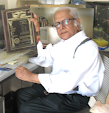The then Union Health Minister Dr. Ambumani Ramadoss enacted the new smoke-free regulation in 2008. India banned smoking in public places on 2 October 2008. Nearly a decade earlier, on 12 July 1999, a Division Bench of the Kerala High Court in India banned smoking in public places by declaring ``public smoking as illegal (the first time in the world), unconstitutional, and violative of Article 21 of the constitution. The bench headed by Dr. Justice K. Narayana Kurup, held that tobacco smoking in public places (in the form of cigarettes, cigars, beedies or otherwise) falls within the mischief of the penal provisions relating to public nuisance as contained in the Indian Penal Code and within the definition of air pollution as contained in the statutes dealing with protection and preservation of environment, in particular, Prevention and Control of Pollution Act 1981. The Supreme Court in Murli S Deora vs. Union of India and Ors., recognized the harmful effects of smoking in public and also the effect on passive smokers, and in the absence of statutory provisons at that time, prohibited smoking in public places such as,1.auditoriums, 2. hospital buildings, 3. health institutions, 4. educational institutions, 5.libraries, 6. court buildings, 7. public office, 8. public conveyances, including the railways.

No comments:
Post a Comment
Question on your Health from surgical oncology Free Answers from Govt Award Winner in Surgical Oncology Dr.K.S.Gopinath.,MD.,FRCS ( England)